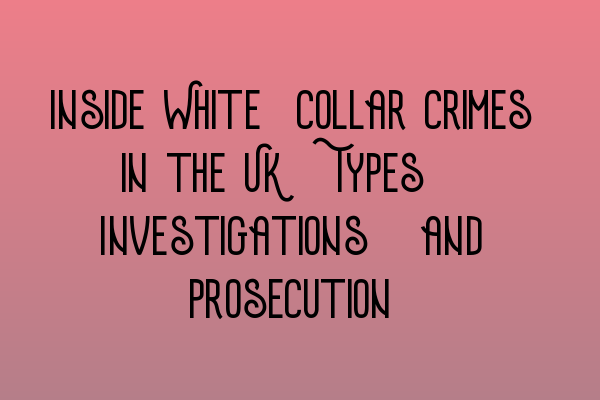Inside White-Collar Crimes in the UK: Types, Investigations, and Prosecution
White-collar crimes are complex and often have far-reaching consequences. These crimes involve individuals who misuse their professional positions to commit fraud, embezzlement, insider trading, money laundering, and other illegal activities. Understanding the types of white-collar crimes, the process of investigation, and the prosecution is crucial in the field of criminal law in the UK.
Types of White-Collar Crimes:
1. Fraud: Fraud involves deception or misrepresentation with the intent to gain an unfair advantage. It can include insurance fraud, credit card fraud, tax fraud, and securities fraud. In recent years, online fraud and cybercrime have become significant concerns.
2. Embezzlement: Embezzlement refers to the misappropriation or theft of funds entrusted to an individual’s care. It commonly occurs in corporate settings, where employees divert company funds for personal gain.
3. Insider Trading: Insider trading involves trading stocks or securities based on non-public information. Those with access to confidential information use it for personal financial gain, which undermines the integrity of the stock market.
4. Money Laundering: Money laundering is the process of disguising the origins of illegally obtained money. Criminals use various methods to make illicit funds appear as legitimate income, making it difficult to trace the source.
Investigations into White-Collar Crimes:
Preventing and investigating white-collar crimes is a complex task. The process typically involves:
1. Initial Complaint: The investigation begins with a complaint or suspicion of illegal activity. This can come from an individual, a company, or a regulatory authority.
2. Gathering Evidence: Investigators will collect and analyze relevant documents, financial records, and electronic evidence. This may require collaboration with forensic accountants, IT specialists, and other experts.
3. Interviews and Interrogations: Investigators will conduct interviews with potential witnesses, victims, and suspects. These interviews aim to gather information and establish the facts of the case.
4. Tracing Financial Transactions: Financial investigators will follow the money trail to identify the flow of funds and uncover any money laundering schemes.
Prosecution of White-Collar Crimes:
Once sufficient evidence has been collected, the prosecution process begins. The prosecution must prove beyond reasonable doubt that the defendant committed the crime. This involves:
1. Charging the Defendant: Formal charges are brought against the accused. The defendant has the right to legal representation and can enter a plea of guilty or not guilty.
2. Trial: The case goes to trial, where both the prosecution and defense present their arguments and evidence. A jury or judge determines the guilt or innocence of the defendant.
3. Sentencing: If found guilty, the defendant is sentenced based on the severity of the crime, their role in the offense, and any aggravating or mitigating factors. Sentences can include fines, restitution, community service, or imprisonment.
Conclusion:
White-collar crimes pose significant challenges to law enforcement and the justice system. Understanding the different types of white-collar crimes, the investigative process, and the prosecution helps legal professionals navigate these complex cases effectively. By staying informed and continuously expanding your expertise, you can become a competent criminal law practitioner in the UK.
For more information on criminal practice and enhancing your SQE criminal law study group experience, explore our related articles:
